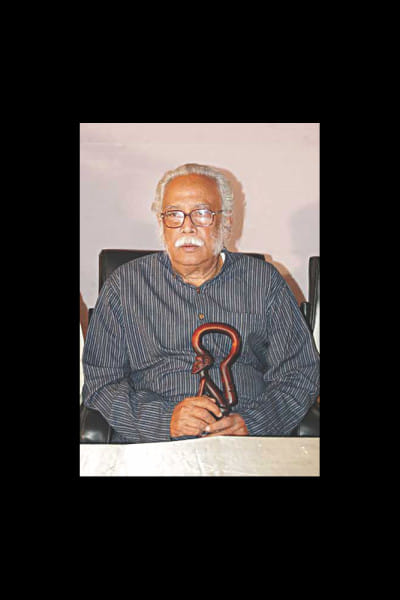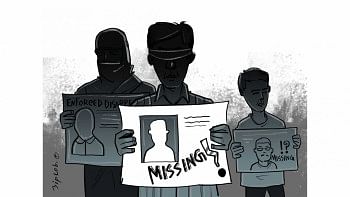Remembering Saleh Chowdhury: A journalist and freedom fighter

Saleh Chowdhury, veteran journalist, freedom fighter, and president of the Bangladesh chapter of Commonwealth Journalists Association, passed away on September 1, at age 82.
Journalism was his vocation and avocation; but in April 1971, he left behind his wife and a young son, journeyed to his home in Sunamganj bordering the Indian state of Meghalaya, and took up arms to fight the Pakistani predators. No matter that he had absolutely no military training or experience, and he was the gentlest human being. But when the call of conscience came, he had no hesitation about what to do.
Saleh was a fighter for freedom in all its dimensions—a fighter against human indignity and bigotry in all forms, and a true protagonist of a generosity of spirit that embraced all who came into his circle.
We first met in 1955 as first-year college students in Murari Chand College in Sylhet. Senior in age by a few years, he came up to me and struck an acquaintance that was the beginning of a lifelong friendship. He had many ideas—interesting, esoteric, and not often practical—but some struck a chord, and we became co-adventurers in many initiatives.
Deeply interested in writing and literature, Saleh recruited his friends including myself to start a literary journal called Ishara, which did not last long. Co-curricular activities at the college were another area that attracted us. We participated in the activities of college students' unions, cultural events and even occasionally embarked on protests against certain political moves of the government or some inane administrative steps of the college authorities.
I had gone off with a scholarship to the American University of Beirut just before General Ayub's military coup and martial law in October 1958. Saleh completed his BA and moved to Dhaka in search of a job, preferably in a newspaper—not easy to come by if one aspired to get a living wage. A chance encounter with the Dean of the Department of Social Work of the Punjab University impressed the dean enough that led to an offer of a scholarship to Saleh for a master's level study at the Punjab University.
For Saleh, the Punjab University days brought into sharp relief the fault lines in the religion-based nation-state premise. At the same time, true to his generous and humanistic credos, Saleh developed an appreciation of the life and culture of the common people in Punjab, and formed some personal lifelong friendships.
On return from Lahore, with a few interesting detours, as a teacher in the newly established University Laboratory School of Dhaka University, and short journalistic forays into several newspapers, Saleh landed in the then Dainik Pakistan, later Dainik Bangla, where he continued till he retired as a Senior Editor.
On return from the battlefront in December 1971, with the declaration of victory, Saleh rejoined Dainik Bangla in his old position as the Assistant Editor. Characteristically, and ignoring advice from well-wishers, he never tried to parlay his freedom fighter's credential to claim a higher position or any other advantage. Many years later, in 2014, someone noticed that Saleh had never been paid the freedom fighter's allowance that was his entitlement. When the accumulated amount was finally paid, he donated it to build memorials for his fallen comrades in Sunamganj.
Saleh Chowdhury was a person of many talents. He dabbled in painting and drawing, sculpture, poetry and literary writing, and writing for children. In any of these fields he could have excelled, if he concentrated hard enough. Restless and impatient, chronicling and commenting on the contemporary scene as a journalist seemed to suit him most. But he maintained a lively interest and engagement in all the other fields.
Saleh had a particularly close personal relationship with two of the giants of Bangla literature—poet Shamsur Rahman and novelist Humayun Ahmed. He compiled and edited several volumes of the collected works of Humayun, who called him Nanaji. As a colleague of Shamsur Rahman, who was for a time the editor of Dainik Bangla, a government-owned newspaper, Saleh was a counsel and confidante in navigating the often politically treacherous waters for a poet with sensitivity and integrity.
Saleh's creative works, such as a brief volume on his memoir and one on his interaction with Humayun Ahmed, were in a light and journalistic vein, in which his generous spirit, old-school aristocracy, and forgiving nature shone. He expressed the wish to write more on his experience as a journalist and the contemporary times, and his take on the creative talent and popularity of Humayun. This is not to be any more.
Manzoor Ahmed is professor emeritus at BRAC University.





Comments